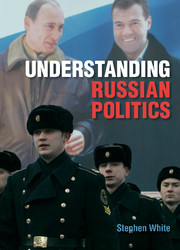Book contents
- Frontmatter
- Contents
- List of figures
- List of tables
- Preface
- Map: administrative units under the 1993 Constitution
- 1 From communist to postcommunist rule
- 2 Voters, parties and parliament
- 3 Presidential government
- 4 From plan to market
- 5 A divided society
- 6 Changing times, changing values
- 7 Russia and the wider world
- 8 What kind of system?
- Notes
- A Note on surveys
- Index
- References
6 - Changing times, changing values
Published online by Cambridge University Press: 05 June 2012
- Frontmatter
- Contents
- List of figures
- List of tables
- Preface
- Map: administrative units under the 1993 Constitution
- 1 From communist to postcommunist rule
- 2 Voters, parties and parliament
- 3 Presidential government
- 4 From plan to market
- 5 A divided society
- 6 Changing times, changing values
- 7 Russia and the wider world
- 8 What kind of system?
- Notes
- A Note on surveys
- Index
- References
Summary
The Soviet Union had eventually established a public opinion research centre, and it was one of the most important of the variety of agencies that followed the public mood in the early years of the new century. It was generally economic issues that mattered most to ordinary Russians, and there was considerable support for many of the principles that had informed the Soviet system in the past, including its provision of full employment and comprehensive social welfare. Letters to the newspapers were another form of communication with the mass of the society that continued into the postcommunist period, and the authorities themselves placed an increasing emphasis on forms of interaction of this kind, in digital as well as more traditional forms. The postcommunist period had also seen the various churches take an increasingly prominent part in public life; but religious beliefs were vague and internally contradictory, and they had little direct effect on political allegiances.
Just as the Soviet Union – or so its citizens told Western television – ‘had no sex’, it also had no ‘public opinion’. Social consciousness, in the official view, was a reflection of forms of property; in a socialist society, based on public ownership, it was characterised by the ‘dominance of Marxist-Leninist ideology in every aspect of the spiritual life of citizens’. In a society of this kind, there was ‘sociopolitical and ideological unity’, and the views of workers, collective farmers and members of the intelligentsia were ‘identical on the basic questions of social development’.
- Type
- Chapter
- Information
- Understanding Russian Politics , pp. 219 - 262Publisher: Cambridge University PressPrint publication year: 2011



